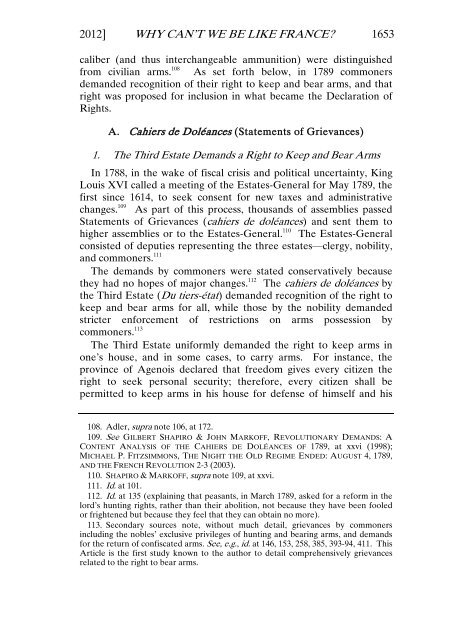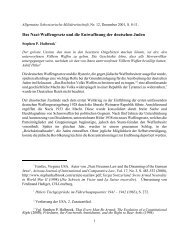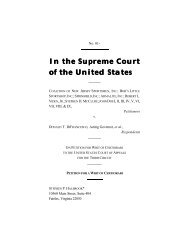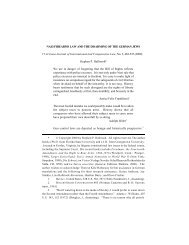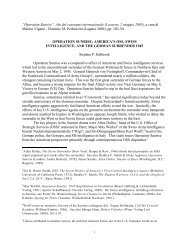France - Stephen P. Halbrook
France - Stephen P. Halbrook
France - Stephen P. Halbrook
Create successful ePaper yourself
Turn your PDF publications into a flip-book with our unique Google optimized e-Paper software.
2012] WHY CAN’T WE BE LIKE FRANCE? 1653<br />
caliber (and thus interchangeable ammunition) were distinguished<br />
from civilian arms. 108<br />
As set forth below, in 1789 commoners<br />
demanded recognition of their right to keep and bear arms, and that<br />
right was proposed for inclusion in what became the Declaration of<br />
Rights.<br />
A. Cahiers de Doléances (Statements of Grievances)<br />
1. The Third Estate Demands a Right to Keep and Bear Arms<br />
In 1788, in the wake of fiscal crisis and political uncertainty, King<br />
Louis XVI called a meeting of the Estates-General for May 1789, the<br />
first since 1614, to seek consent for new taxes and administrative<br />
changes. 109<br />
As part of this process, thousands of assemblies passed<br />
Statements of Grievances (cahiers de doléances) and sent them to<br />
higher assemblies or to the Estates-General. 110<br />
The Estates-General<br />
consisted of deputies representing the three estates—clergy, nobility,<br />
and commoners. 111<br />
The demands by commoners were stated conservatively because<br />
they had no hopes of major changes. 112<br />
The cahiers de doléances by<br />
the Third Estate (Du tiers-état) demanded recognition of the right to<br />
keep and bear arms for all, while those by the nobility demanded<br />
stricter enforcement of restrictions on arms possession by<br />
commoners. 113<br />
The Third Estate uniformly demanded the right to keep arms in<br />
one’s house, and in some cases, to carry arms. For instance, the<br />
province of Agenois declared that freedom gives every citizen the<br />
right to seek personal security; therefore, every citizen shall be<br />
permitted to keep arms in his house for defense of himself and his<br />
108. Adler, supra note 106, at 172.<br />
109. See GILBERT SHAPIRO & JOHN MARKOFF, REVOLUTIONARY DEMANDS: A<br />
CONTENT ANALYSIS OF THE CAHIERS DE DOLÉANCES OF 1789, at xxvi (1998);<br />
MICHAEL P. FITZSIMMONS, THE NIGHT THE OLD REGIME ENDED: AUGUST 4, 1789,<br />
AND THE FRENCH REVOLUTION 2-3 (2003).<br />
110. SHAPIRO & MARKOFF, supra note 109, at xxvi.<br />
111. Id. at 101.<br />
112. Id. at 135 (explaining that peasants, in March 1789, asked for a reform in the<br />
lord’s hunting rights, rather than their abolition, not because they have been fooled<br />
or frightened but because they feel that they can obtain no more).<br />
113. Secondary sources note, without much detail, grievances by commoners<br />
including the nobles’ exclusive privileges of hunting and bearing arms, and demands<br />
for the return of confiscated arms. See, e.g., id. at 146, 153, 258, 385, 393-94, 411. This<br />
Article is the first study known to the author to detail comprehensively grievances<br />
related to the right to bear arms.


